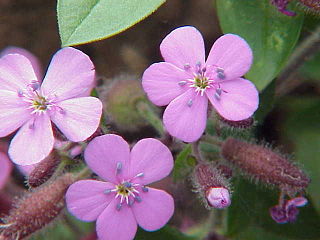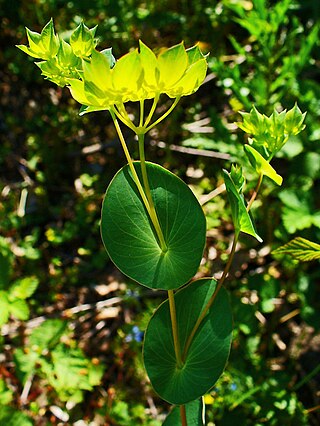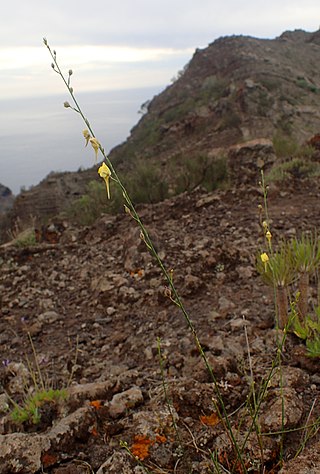
Nepeta is a genus of flowering plants in the family Lamiaceae. The genus name, from Latin nepeta (“catnip”), is reportedly in reference to Nepete, an ancient Etruscan city. There are 295 accepted species.

Saponaria is a genus of flowering plants in the family Caryophyllaceae, native to Asia and Europe, and are commonly known as soapworts. They are herbaceous perennials and annuals, some with woody bases. The flowers are abundant, five-petalled and usually in shades of pink or white. The genus is closely related to the genus Silene, being distinguished from these by having only two styles in the flower. It is also related to Gypsophila, but its calyx is cylindrical rather than bell-shaped.

Petrorhagia is a small genus of annual and perennial plants of the family Caryophyllaceae, mostly native to the Mediterranean region. It is low-growing with wiry stems and narrow, grass-like leaves. The flowers are small, in clusters similar to members of the genus Dianthus, in pink, lilac, or white. Petrorhagia saxifraga is the tunic flower or coat flower, similar to baby's breath, but shorter, and used in rock gardens.

Bupleurum is a large genus of annual or perennial herbs or woody shrubs, with about 190 species, belonging to the family Apiaceae. The full size of its species may vary between a few cm to up to 3 m high. Their compound umbels of small flowers are adorned with bracteoles that are sometimes large and may play a role in attracting pollinators. Rare among the Apiaceae are the simple leaves, bracts, and bracteoles. The genus is almost exclusively native in the Old World Northern Hemisphere, with one species native to North America and one species native to southern Africa.

Arenaria is a genus of flowering plants, within the family Caryophyllaceae.

Nanorrhinum is a genus of flowering plants in family Plantaginaceae. It includes 29 species ranging from the Sahara and Sahel of northern Africa to the Arabian Peninsula, Iran, the Indian subcontinent, and Myanmar.

Trichodesma is a genus of flowering plants in the borage family, Boraginaceae. There are 38 species distributed in tropical and subtropical regions of Africa, Asia, and Australia.

Pimpinella is a plant genus in the family Apiaceae; it includes the aromatic herb anise (P. anisum).

Trachyspermum is a genus in the plant family Apiaceae.

Acanthophyllum is a genus of flowering plants in the family Caryophyllaceae with about 75 species, spread in the Irano-Turanian area.

Eremogone is a genus of flowering plants in the family Caryophyllaceae, native to western North America, northern Asia, eastern Europe and northeastern Africa. Attempts to resolve taxonomic relationships within the Caryophyllaceae have resulted in the enlargement of Eremogone with species from other genera.
Diplotaenia is a genus of flowering plants belonging to the family Apiaceae.
Semenovia is a genus of flowering plants belonging to the family Apiaceae. It is in subfamily Apioideae and also tribe Tordylieae subtribe Tordyliinae.
Pycnocycla is a genus of flowering plants belonging to the family Apiaceae.

Sabulina is a genus of flowering plants in the family Caryophyllaceae. It includes 74 species native to temperate and subtropical North America, Eurasia, and North Africa.
Dichodon is a genus of flowering plants in the carnation family, Caryophyllaceae. It includes seven species native to temperate and boreal Eurasia and Morocco, Greenland, and eastern Canada.











